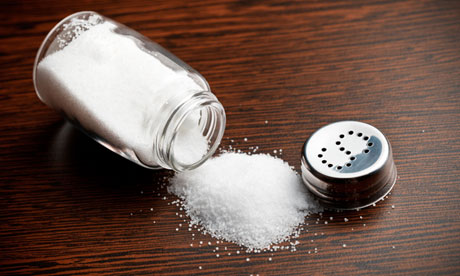Government advice is that you should use just half a pinch of salt a day. But the only people who appear to pay any attention to this are those with cooking shows on TV

Salt has been used throughout history to preserve food, but it is also linked to many health problems. Photograph: Alamy
Cooking telly is full of frauds. Sit and watch with anyone who's worn chef's whites and they will spot a host of lazy fictions guaranteed to make them snort and pshaw. A popular one is that on TV no one puts their fingers in the food: in a working kitchen, the digits are the most used tool of all. Another is the salt thing.
On television you will hardly see a shake of the white powder. But in real kitchens, they lay it on thick: "Correct seasoning to a chef is as much salt as you can put in without it tasting too salty," Bocca di Lupo's Jacob Kennedy says. "That's why we all die young."
In his last book, Cooked, the American eco-food guru Michael Pollan gets busy preparing a piece of meat for grilling. A chef tells him to lay on the salt. "Use at least three times as much as you think you should." Shocked, Pollan consulted another pro. He agreed, but "upped the factor to five". Science explains why: long-chain carbohydrates in cooked food neutralise natural salt by binding in the sodium ions. For taste, it needs replacing.
So it's no great shock when survey after survey finds higher levels of salt from high-street restaurants – Domino's, Wetherspoon's, Carluccio's and Jamie's Italian were all putting more salt in single dishes than adults are supposed to eat in a whole day.
But what we're supposed to eat is ridiculously, you may even think unfeasibly, little. The NHS recommends just 4g of salt a day for a child (a small teaspoonful) and 6g for an adult (a large teaspoonful). But the NHS also says that up to 90% of the salt we eat comes already present in our food, so we should only be using adding 0.6g or half a pinch. My mother uses half a teaspoon of salt or more every time she sits down to eat, usually before she has tasted the food. (At nearly 80, she admits to being well preserved.)
As with so many ingredients, there's good and bad when it comes to salt.
The bad
It hardens your arteries and drives up blood pressure, leading to heart attacks and strokes. The latest medical charge against it is that it may be acting as a secret agent, "driving our immune systems to rebel against us". It may also play a leading role in multiple sclerosis. Nonetheless, wicked salt dealers are working to persuade you to eat even more. The Department of Health has said that reducing salt intake by just 1g a day – just a pinch – would save 4,147 preventable deaths and £288m.
The good
For 6,000 years it has been preserving fish and meat to keep humans alive in hard times and produce such glories as jamon serrano and brandade of salt cod. Salt is instantly vivid; it puts a shoulder to a shy taste and shoves it on to the stage. Try salting a boiled egg, or a slice of avocado, to watch something bland come alive - try it on everything, actually.
Also, get it while you can. With transfats gone and sugar under attack, salt may be the next ingredient to come under the pitiless eye of the law. Legislators in New York have already made one attempt to get salt banned in restaurants. According to Time magazine, federal legislation on salt content in packaged and restaurant food is under consideration.
What to do?
Manufactured food tends to use a lot of salt, especially if it claims to be "healthy", because salt fills in for taste when fat or sugar is removed to lower calories. But lots of basic foods we use are high in salt: bread, cheese, sun-dried tomatoes, pickles and so on. And – hold on to your seats – crisps and bacon. Not to mention those damnable salty caramel-flavoured sweets.
Clearly, avoiding ready meals and processed food is one way to allow yourself more salt in your cooking. Or you could just ignore the advice, and carry on salting. Anthony Bourdain – the chef who first lifted a lid off the seamy truths of the professional kitchen, has no time for the salt police. "It's what makes food taste good," he told Time magazine. "Traditional, intelligent and skilled used of salt has become confused in the minds of nanny-state nitwits with the sneaking of salt into processed convenience foods. Nothing else encapsulates the mission of the food ideologues better than this latest intrusion: they desire a world without flavor."
So, could you cook with half a pinch a day?